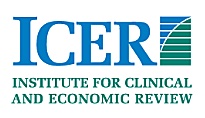Closer Look at ICER, Group Now Weighing Efficacy and Benefits of RRMS Therapies
Written by |

 The Institute of Clinical and Economic Review (ICER), the nonprofit organization that released a preliminary draft last week intended to shape the Institute’s forthcoming report on the effectiveness and benefits of therapies for relapsing-remitting multiple sclerosis (RRMS), is made up of experts in healthcare policy from across the U.S. who, through the group’s Advisory Boards, offer strategic advice on major health topics and treatments.
The Institute of Clinical and Economic Review (ICER), the nonprofit organization that released a preliminary draft last week intended to shape the Institute’s forthcoming report on the effectiveness and benefits of therapies for relapsing-remitting multiple sclerosis (RRMS), is made up of experts in healthcare policy from across the U.S. who, through the group’s Advisory Boards, offer strategic advice on major health topics and treatments.
Specifically, ICER conducts analyses on treatment effectiveness and costs, and develops reports using methods that make it easier to translate evidence into decisions. The Institute says the preliminary ‘scoping document,’ titled “Disease Modifying Therapies for Relapsing-Remitting Multiple Sclerosis: Effectiveness and Value, Draft Background and Scope,” was developed with extensive input from several stakeholders, including multiple sclerosis (MS) patient advocacy organizations.
ICER’s research process encourages inclusion of a broad range of disease-modifying therapies, and the scoping document is available for public scrutiny. ‘Scoping’ is the term used by ICER to describe the process of refining a research topic and defining key questions that will form the basis of both the evidence review and the panel’s deliberations during in-person meetings, supporting the goal of getting effective, safe drugs to market quickly at a price affordable to patients and the health system, without hindering new drug development.
Evidence informing the ICER review will be extracted from randomized controlled trials, and high-quality systematic reviews and comparative cohort studies will also be considered, particularly data on long-term outcomes and uncommon adverse events. The evidence review will include input from patients and patient advocacy organizations, data from regulatory documents, information submitted by manufacturers, and other literature when the evidence meets ICER standards.
Wherever possible, ICER researchers will seek head-to-head studies of interventions under review. In the absence of such studies, they will refer to placebo-controlled studies and derive indirect comparisons from a network meta-analysis.
As Multiple Sclerosis News Today reported last week, ICER relies on stakeholder input and involvement in reporting development of its core programs to ensure that information contained is relevant and useful to a broad range of decision-makers. ICER’s public meetings include time for review and deliberation of comparative effectiveness information by the program’s voting panel, as well as for public comment.
Members of the public are also invited to submit written comments at various stages of the research process to inform the evidence review presented to the panel during the meeting, as well as the panel’s deliberation and votes. You can find out more about making comment submissions in ICER’s recently revised guidelines here:
https://icer-review.org/wp-content/uploads/2016/02/ICER-Public-Comment-Guide.pdf
A revised scoping document for the MS report is to be posted on or about July 22, and will serve as a guide to the Draft Evidence Report projected that ICER expects to have ready to posted around Nov. 22, followed by a three-week open public comment period. During that time, ICER will again invite interested stakeholders to submit comments, suggestions, and proposed refinements to the report.
Under review are the more than 10 disease-modifying therapies (DMTs) approved by the U.S. Food and Drug Administration (FDA) for treating RRMS — the therapeutic goal of DMTs being to decrease the frequency of relapses and prevent disability that accumulates as the disease progresses over decades. As ICER notes in its scoping document, however, such a review is a difficult and complex task. Some neurologists subscribe to the school of thought that the main goal of MS treatment should be eradication of all disease activity, as determined through magnetic resonance imaging (MRI). The relative efficacy of various MS drugs also remains controversial, and several newer drugs can cause life-threatening complications such as central nervous system (CNS) infections, autoimmune disease, cardiac toxicity, liver toxicity, and cancers. Moreover, RRMS is a heterogeneous disease, and making comparisons across DMT study data complicated.
Drugs to be reviewed in ICER’s analysis — regarding comparative clinical effectiveness, cost-effectiveness, and budget impact on patients and the healthcare system— include:
• Platform agents: interferon beta-1a, peginterferon beta-1a, interferon beta-1b, and glatiramer acetate; particular focus should be given to the comparison of two competing formulations of interferon beta-1a (Rebif and Avonex)
• Oral agents: fingolimod (Gilenya), teriflunomide (Aubagio), and dimethyl fumarate (Tecfidera)
• Other injectable or infused agents: natalizumab (Tysabri), alemtuzumab (Lemtrada), rituximab (Rituxan), daclizumab (Zinbryta), and ocrelizumab (Ocrevus).
Because there is currently no definitive guideline to assist clinicians in making decisions regarding both initial RRMS therapy and subsequent therapy choices (in cases of treatment failure), considerable uncertainty exists regarding interpretation and application of the current evidence, both in terms of clinical practice and insurance coverage policy. The draft authors note that patient preference plays a role in the scope of the assessment, including a general preference for oral medications over injectable ones, and additionally that advocacy organizations have emphasized that some patients have a low tolerance for risk and are less likely to choose DMTs with known, potentially severe side effects.
The ICER report assessing RRMS treatments will also serve as the basis for deliberation and discussion at a public meeting of the California Technology Assessment Forum(CTAF), a core program of ICER, in February 2017. An independent, regional body of practicing physicians, methodological experts, and leaders in patient advocacy, CTAF’s mission is to provide objective, independent guidance on application of medical evidence to clinical practice and payer policy decisions.
During that February public meeting, the CTAF panel will vote on key questions raised in the report. A policy roundtable of MS patient, clinical, payer, and policy experts will discuss recommendations regarding how to best apply evidence contained in the RRMS report to policy and practice.
Sources:
The Institute of Clinical and Economic Review (ICER)


